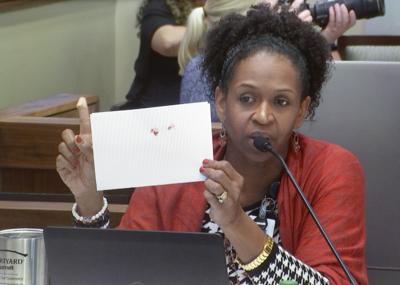The fledgling Baton Rouge Community Police Ambassador program is planning to host public discussions on race at its monthly meetings in hopes of addressing what some consider underlying racial tensions that can affect interactions between police and the public.
It's part of a larger push by East Baton Rouge Parish Metro Councilwoman Tara Wicker and others to send a clear message that black and white residents of Baton Rouge are "better together."
Ambassadors agreed at the meeting Tuesday to focus some of their work on healing those divisions within the community, which rose to the surface in the aftermath of the fatal police shooting of Alton Sterling and subsequent ambush on law enforcement in summer 2016.
"The more that we dig and the more that we have that conversation, the more we are alike than different," Wicker told ambassadors during the meeting. "Do I think this room is healed? No. … Exposure is the best educator, and we're just trying to expose each other to the other side. If we never do that then we never heal."
Participants have acknowledged in recent months — since the first class of ambassadors completed training earlier this year — that divisions along racial lines have sometimes affected their ability to work as a cohesive unit in pursuit of their common goal: to improve relations between Baton Rouge police officers and the people they serve.Â
About six months into the Baton Rouge community police ambassador program — aimed at reducing tensions between law enforcement and residents —…
Wicker has been instrumental in launching the ambassador program over the past two years. She helped found a committee to discuss law enforcement policy recommendations in response to the events of summer 2016 and the program arose from those committee meetings.
Wicker also recently faced an uncomfortable public confrontation of her own when other black council Democrats likened her to Judas for reaching across political and racial lines. She nonetheless cast the deciding vote to allow Buddy Amoroso's wife to fill his seat after the Republican councilman was killed in a West Feliciana Parish bicycle accident earlier this summer.
The contentious battle over who should fill Buddy Amoroso’s Metro Council seat ended Thursday evening as his widow, Denise Amoroso, secured th…
Three Democratic council members upheld a pledge to abstain from voting for anyone to fill the seat to avoid supporting the white Republican majority. They were vocal in their opposition to Wicker's dissent while her supporters praised her for setting a brave example of compromise.
Two of Wicker's constituents and Baton Rouge NAACP President Byron Sharper later filed a recall petition against her. The petitioners have about six months to collect signatures from a third of the registered voters in Wicker's council district, which encompasses Old South Baton Rouge, downtown and parts of north Baton Rouge. Sharper said Wednesday he's confident organizers will be successful in collecting enough signatures for the effort to move forward.
Two of Tara Wicker’s constituents and the president of the Baton Rouge NAACP filed a recall petition against her Thursday, ratcheting up the f…
Wicker announced the "What Color is Love?" race talk initiative during a Metro Council meeting Wednesday alongside Councilman Trae Welch, who also helped found the ambassadors' program. They both brought their children for the announcement and played
"The focus of this campaign is to further establish an opportunity for open, transparent and meaningful conversation about the issue of race in our city (and) the impact it has on our community as a whole," the council members said in a news release Wednesday, noting that the initiative is in partnership with their "One Blood" campaign.Â
That campaign grew out of the recent council meeting when Wicker voted to allow Denise Amoroso to fill her late husband's seat. At one point during the meeting, Wicker held up a paper with drops of her blood and Welch's blood on it, making the point that they are the same inside. She said it's a lesson more people in Baton Rouge should take to heart.
Chauna Banks, another democratic council member, criticized the new campaign when Wicker and Welch announced it Wednesday.
"All of us would agree we all share one blood, which is red. The issue is the color of our pigmentation," she said. "We should not do showtime, we should not do things just to make the news. … The whole goal of being different, I believe, is so that we will respect and love each other based on those differences."
Members of the ambassadors' program have also discussed the possible benefits — and drawbacks — of confronting racial tensions. But they seem to have reached a consensus in agreeing with Wicker that progress is needed.
Dmitrius McGruder, a former East Baton Rouge sheriff's deputy and recent graduate of Southern University law school, said he thinks the race talks will give ambassadors and members of the public a chance to overcome some of their differences even though the conversations could become uncomfortable.
"It might be easier to have those conversations with people you're comfortable with, but I don't think it's that productive," he said at the meeting Tuesday. "The conversation flows a lot smoother but I don't think ultimately it's producing those results that we all want."





